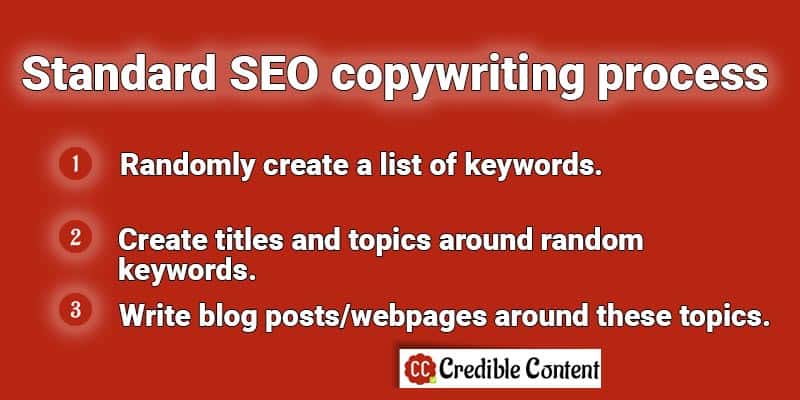Main copywriting mistakes covered in this blog post:
- Writing without having a central vision.
- Ignoring search intent or buyer intent.
- Not doing methodical keyword research.
- Using too many complex and compound sentences and big paragraphs.
- Not using the main keyword synonyms and LSI alternatives.
- Not writing the copy from the user’s perspective.
- Using main keywords when linking to internal links (something new that I have learnt).
SEO copywriting is intended to improve your search engine rankings.
Want to know which SEO copywriting mistakes to avoid so that you don’t harm your SEO?
There is a complete branch dedicated to such writing.
There are numerous blogs that teach you how to improve your search engine rankings through targeted web copywriting.
The problem with pursuing web page writing mainly with the objective of improving your search engine rankings can be a double-edged sword.
Normally, people who want to improve their SEO do the following
- Create a list of keywords and search terms they think people should be using to find their websites.
- Create titles and topics around those keywords and search terms.
- Write and publish content based on those titles and topics.
In theory there is nothing wrong in this approach but then there may be something completely wrong in it.
Remember that the purpose of optimization is not to get traffic for your keywords.
The purpose of optimization is to help people find your useful content so that they can find the information they are looking for.
Hence, if you’re using copywriting just to improve your SEO, you may be harming your search engine rankings instead of improving them.
Fortunately, most of the copywriting mistakes are easily avoidable and you just need to make some tweaks and keep in mind certain aspects when preparing the copy of your web page.
I’m listing below some copywriting mistakes that are bad for your SEO.
1. Not having a vision for your
In my profession, content writing and copywriting are often interchanged so for the purpose of this blog post, you can assume that whatever I’m writing about SEO copywriting, I’m also writing about content writing.
Although, in terms of advertising and sales copy writing, copywriting is different from content writing, but when it comes to writing for the web, many people use this term interchangeably.
You may like to read Difference between copywriting and content writing.
With this minor detail out of the way, whenever you’re writing the copy of a web page or blog post, it is very important to have a vision.
What does “vision” mean here?
What is the purpose of writing that web page?
What do you want to achieve with this blog post?
What am I trying to achieve with this blog post?
The simplest answer would be, I’m trying to improve my search engine rankings for the phrase “SEO copywriting” and even “copywriting mistakes” and I won’t deny that.
But, better search engine rankings for these phrases will be a byproduct.
In the video below, I have explained this concept by comparing your higher search engine rankings with the money that you earn by providing a product or a service.
My primary aim is to provide you the best possible content on this subject.
After reading this blog post, you should have a list of copywriting mistakes that you can avoid to improve your search engine rankings.
Instead of just talking about this copywriting mistakes and listing them, I’m also suggesting improvements.
Similarly, for every web page and for every blog post, you must have a clear vision, a clear purpose, of what you’re trying to achieve, not just in terms of improving your SEO, but also in terms of providing the best possible value to your readers.
2. Ignoring search intent when copywriting
This is one of the most important SEO copywriting mistakes to avoid.
Search intent is gaining importance with every passing day.
What intention do people have when they search for your content?
Here is a small video I created to explain what is search intent.
For example, what intent would there be, when people are looking for this blog post?
They want to improve their search engine rankings.
They want to avoid content writing and copywriting mistakes so that they don’t inadvertently harm their search engine rankings instead of improving them.
They want to learn from the mistakes of the others.
Knowing the search intent helps you take the right direction.
Your copywriting must always be focused on a particular search intent.
Do you simply want to educate and inform (like this blog post)?
Do you want people to buy from you after reading your web page or blog post?
Do you want them to download your e-book or white paper or case study?
Do you want them to subscribe to your newsletter?
Search intent is also known as “buyer intent”.
3. Not doing proper keyword research
All said and done, keywords are still matter.
Google, when analyzing your text, looks for patterns to make sense of what you’re trying to say or convey to the reader.
It analyzes every possible combination.
For example, for me, what matters is the keyword “copywriting mistakes”, but to Google, in the above paragraph, even “when analyzing your text” is as important as “copywriting mistakes”.
The Google algorithm is least bothered with what you think is your important keyword.
It goes through every single word and every single phrase and does its computations.
Hence, the words that you use when you are writing your copy are very important.
It is an age-old advice: choose your words carefully.
The same applies to selecting your keywords when copywriting.
Not making a list of the right keywords may send you on a tangent and you may end up optimizing your copy for all the wrong keywords.
Wondering why your traffic is increasing but your business is not?
It is because you are attracting traffic for all the wrong reasons.
You may be optimizing your content for the wrong keywords.
4. Not using simple sentences when preparing your copy
A few years ago, I read that the processing power of a supercomputer is less than the processing power of the brain of an earthworm.
No matter how smart machine learning becomes, it gets confused when you use compound sentences.
I often come across webpages and blog posts containing complex sentences.
People use lots of ands, alsos and buts.
Compound and complex sentences may make you sound smarter and intelligent, to the search engine algorithm, they are confounding.
For better SEO, it is always advisable to use simple sentences.
Don’t use multiple sentences in a paragraph.
Try to limit your sentences to 5-10 words and not more.
Of course, it is not possible all the time, but whenever you are talking about the central theme, for example, the biggest benefit of doing business with you, use single, simple sentences in every paragraph.
5. Ignoring to use synonyms and LSI keywords
Instead of saying “I want to improve my SEO” every time you need to use this expression, sometimes you can also use “I want to improve my search engine rankings”, or even, “I want to improve my Google rankings”, or even, “I want higher rankings for my web pages”.
You need to dominate your copy with the central theme, and this may require you to use your keywords repeatedly.
Hence, instead of “harm your SEO”, I can also use “hurt your SEO” or “adversely affect your rankings”.
This is because if you keep on using your main keywords Google may take it as keyword stuffing, which it actually is.
If you repeatedly use your keywords without alternating between LSI keywords and actual keywords, it will harm your SEO instead of improving it.
LSI stands for “Latent Semantic Indexing”.
It is a natural language processing technology that helps Google understand the context of your content rather than merely analyzing keywords.
For example, when you search for “what are the benefits of having an apple everyday” through LSI Google knows that you’re talking about the fruit and not the company.
There is another benefit of using LSI as well as synonym keywords.
Not everyone uses the same search term when looking for information.
For example, instead of someone searching for “copywriting mistakes”, he or she can also search for “bad copywriting” or “copywriting blunders” or “what makes my copywriting harm my SEO?” or “what makes my copywriting suck?”
Hence, accommodating different keywords and search terms increases the scope of your content being rank for different keywords without diluting the central topic.
6. Not writing from user’s perspective
Again, one of the most common SEO mistakes to avoid.
This is important for your rankings as well as conversion rate.
Why does your content exist, after all?
It exists to serve your readers.
Why do search engines like Google exist?
They are there to help you find the information you’re looking for.
From every angle, it is a human angle.
If you ignore the human angle and write your copy only to cater to the algorithms, the entire purpose of SEO is defeated.
The Google search algorithm depends a lot on how people perceive the quality of your content or copywriting.
For more clarity, you may like to read Relationship between quality content writing, bounce rate and SEO.
In the above post I have also used a small video to explain the concept with animation.
So, whether you use your keywords or not is secondary, the most important thing to keep in mind when copywriting is writing for your audience.
If you ignore your audience, nothing else matters.
7. Using your main keywords in hyperlink text
Actually, this is something that I have learned recently.
You should not use your keywords as anchor text for internal links.
When writing copy for your web pages and blog posts, you’re often encouraged to link to other inner pages of your website and even external pages when you want to link to the source of your information.
Google sees this as an act of manipulation.
Since you cannot control how people link to your website, Google doesn’t penalize you if your main keywords are used as anchor text from other websites, but for interlinking (linking to your own web pages and blog posts within your domain), instead of using something like SEO copywriting as anchor text, use a long phrase.
Until a few years ago, I remember this was a prevalent advice that you should use your primary keywords as anchor text when linking to different parts of your website or blog, but it remains no longer kosher.
You can read in the above link, you can get penalized for this.
Concluding remarks the most common SEO copywriting mistakes to avoid
Whenever you are copywriting there is a 99% chance that you are doing it to improve your search engine rankings.
There is nothing wrong in that.
The biggest mistake I have come across is that when clients approach me for my copywriting services, they are less concerned about providing value to the readers and more concerned about “the keyword density must be around 3-5%”.
It rarely happens that a client says that I should first focus on quality and then, if possible, I should include the main keywords.
Anyway, the purpose of writing this blog post was to throw some light on the issues that can negatively impact your search engine rankings while in the sincerity of your heart, you are trying to improve it with certain copywriting practices.
Ummm… yes, I know, the above sentence is not good for SEO.


